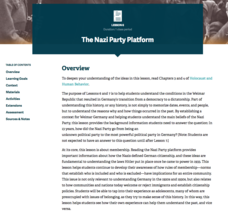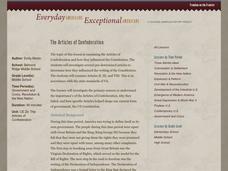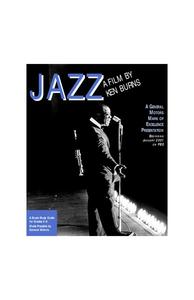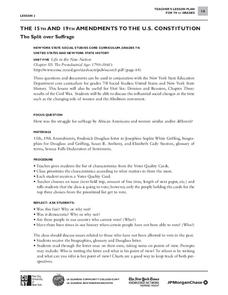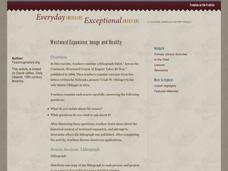Facing History and Ourselves
The Nazi Party Platform
Not all party platforms stay democratic. A resource covers many political issues in Germany during the time of World War II, and teaches pupils about the Nazi party platform and what went wrong. Individuals participate in a warm-up...
National Endowment for the Humanities
Lost Hero: Was John Hanson Actually the First President?
The first president of the United States was ... John Hanson? Scholars investigate the notion that the initial leader of the nation was not George Washington. Using research, articles, and open discussion, individuals create a quest for...
National Endowment for the Humanities
The "To Do List" of the Continental Congress
What is on your to-do list today? The second lesson of a three-part series on Lost Heroes of America investigates the laundry list of items in front of the second Continental Congress. Scholars research, analyze, and present information...
The Alamo
The Alamo
Remember the Alamo! Scholars investigate the Battle of San Jacinto during the Texas Revolution. Using models, maps, quotes, biographies, and the Oath of Allegiance, the Alamo comes to life as the stories of those who fought and died in...
Roy Rosenzweig Center for History and New Media
The Articles of Confederation
Have you ever started a project only to realize you need to scrap it and start over? Scholars analyze the issues leading to the fall of the Articles of Confederation. A group investigation into Articles II, III, and VIII unveil the...
University of Pennsylvania
Decoding Propaganda: J’Accuse…! vs. J’Accuse…!
Reading snail mail is a great way to go back into history and to understand others' points of view. The resource, the second in a five-part unit, covers the Dreyfus Affair. Scholars, working in two different groups, read one letter and...
University of Pennsylvania
Using Political Postcards to Teach a Revolution of Political Thought
Discuss how political postcards affected everyday people's thoughts and beliefs. Pupils continue a unit on the Dreyfus Affair as they engage in class discussion, watch a video, view a PowerPoint presentation, and fill out worksheets to...
Curated OER
Curriculum Guide For Teaching Texas History
Follow Texas history from Native Americans all the way to the 21st Century. Teachers analyze the creation of a year-long course on Texas history and use a wide range of teaching subjects and materials to guide them through the state's...
Smithsonian Institution
Voices of Bull Run
Soldier's lives are often a topic when studying the Civil War, but what about the lives of civilians? Scholars use the characters from the novel Bull Run to better understand the lives of those not directly on the Civil War battlefields....
iCivics
Step Three: Who You Gonna Call?
Problem solving is an essential skill everyone must master. The resource instructs pupils how to analyze different scenarios and decide the best way to solve many different problems that take place in communities. Scholars read, discuss,...
Newspaper Association of America
Community Connections with Geography and the Newspaper
Understanding geography and government begins at the local level. Using maps and the parts of a newspaper, a unit plan introduces the concept of community. It starts with the creation of classroom and school maps, and then moves through...
Newspaper Association of America
Using the Newspaper to Teach the Five Freedoms of the First Amendment
Of all the amendments found in The Bill of Rights, the First Amendment contains some of the most important freedoms for American citizens. A unit plan on the First Amendment features interactive lesson plans designed to teach about those...
Ohio Center For Law-Related Education
Four Activities: Thurgood Marshall and the Nomination and Confirmation of Federal Judges
The process of nominating and confirming federal judges can sound like a lot of bureaucratic hoops, but a resource breaks down the steps of the Supreme Court nominations in a simpler manner. Learners participate in four activities that...
General Motors Corporation
Jazz
Over the history of the world, music has been at the heart of some of the greatest social and political movements. Scholars discover their musical roots as they dive into the sounds and emotions of renowned jazz players. They see how...
University of California
The Civil War: Effects of the Civil War
Imagine being on the front line of the Civil War —from the front porch of your own house. Scholars use visual evidence from primary and secondary sources to analyze the impact of the Civil War on all Americans. They examine the research...
National Endowment for the Humanities
Life Before the Civil War
American life before the Civil War was very different from American life today. To show this difference in a full spectrum, learners compare two communities that illustrate the differences between Northern and Southern life. Throughout...
National Endowment for the Humanities
George Washington: The Precedent President
Everyone knows that George Washington was the first president, but do your scholars know why that was so important? The lesson plan, the third in a sequence of three, allows learners to understand how George Washington set a precedent...
City University of New York
The 15th and 19th Amendments to the U.S. Constitution
Who gets to vote? Learn more about struggles for suffrage throughout United States history with a lesson based on primary source documents. Middle schoolers debate the importance of women's suffrage and African American...
Roy Rosenzweig Center for History and New Media
Westward Expansion: Image and Reality
As your young historians study Westward Expansion, practice in-depth primary source analysis with the documents and guidelines presented in this resource. They will examine a lithograph and excerpts from two letters written by a Nebraska...
Mr. Roughton
The Travels of Marco Polo
Were the stories of Marco Polo's travels and interactions with the Mongols actually true? Using an excerpt from the book The Travels of Marco Polo, your young historians will answer guiding questions to discuss the accuracy and...
Atlanta History Center
Civil Disobedience and the Atlanta Student Movement
What tactics are used in civil disobedience? Learners study the conditions in Alabama that led to the establishment of the Atlanta Student Movement, as well as consider the nature and effectiveness of civil disobedience.
Humanities Texas
Primary Source Worksheet: Letter Regarding the Whiskey Rebellion
Analyze the federal government's direct response to the Whiskey Rebellion through this fantastic primary source analysis activity activity.
Curated OER
Feudal Powers in Japan
A traditional textbook chapter focuses on feudal powers in Japan, and includes vocabulary, note-taking tips in the sidebar, main ideas, and follow-up assessment questions. It also incorporates opportunities for art...
Curated OER
Claudette Colvin: Twice Toward Justice
Use the historical account of Claudette Colvin to study civil rights and connect past injustices to modern issues. As learners read, they examine chapter titles, record quotes, and participate in discussion. Next, they research...
